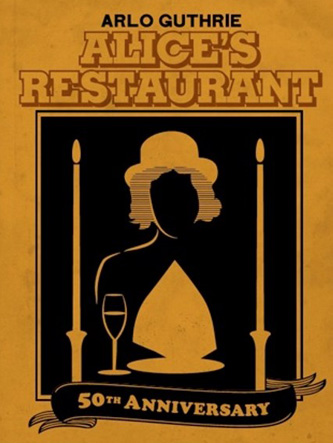
GREENSBURG, Pa. – Folk singer Arlo Guthrie is in the midst of an extensive tour across America, commemorating the 50th anniversary of the actual events that led to his classic recording of “Alice’s Restaurant.“When one thinks of seminal anti-war songs from the 1960s, this enduring anthem remains an influential American original. It was Thanksgiving Day 1965, in Stockbridge, Mass., that Arlo Guthrie was cited for littering and subsequently appeared in court and paid a fine. Not long after that incident, at the height of the Vietnam War, Guthrie was turned down by the draft board in New York City because of his criminal record of “littering.”
Thus was born “Alice’s Restaurant Massacree,” an 18-minute musical monologue that appeared on his 1967 debut album. In Guthrie’s words, he questions why he is not “moral enough to join the Army – burn women, kids, houses, and villages…after being a litterbug.” At the end of the song, he asks everyone to join in and start a movement of peace.
The Guthrie family is immersed in musical talent and folk traditions. Joining her father on stage for select tour dates is talented performer Sarah Lee Guthrie. The singer/songwriter/guitarist has an endearing stage presence, and opens with a selection of classics by the likes of Tim Hardin and Donovan, plus original material. Sarah Lee Guthrie has put new music to lyrics and words written by her grandfather (and Arlo Guthrie’s father), the legendary Woody Guthrie. One fine example of this is a children’s song titled “Go Waggaloo,”in which she encourages the audience to sing along.
The 50th Anniversary Tour is a special event for all fans. Due to its length, Arlo Guthrie only performs “Alice’s Restaurant”in concerts at ten-year intervals. This time around a video screen enhances the performances with scenes from the 1969 movie of the same name. The film recreated the true events that inspired the song. Arlo Guthrie shares some of the backstory on stage. The original arresting officer, William Obanhein (Officer Obie) and Judge James E. Hannon, who presided over the littering case, played themselves on screen. Guthrie explains how he eventually maintained a friendship with Obanhein although they disagreed on many social issues. He tells his audience the world is in need of more people who attempt to get along despite differences of opinions.
Folk music has a faithful following, and all age groups could be seen in this southwestern Pennsylvania audience. Small children joined their parents to experience this great traditional and cultural art form. The theme of these shows is definitely one of family and togetherness. Audience members feel as if they are an integral part of the gathering. Arlo Guthrie’s performances are a musical history of folk music in America. His stories of Pete Seeger, Ramblin’ Jack Elliott, Lead Belly, and Cisco Houston create a memorable evening. Arlo Guthrie’s son, Abe Guthrie, is also featured on stage at the keyboards.
Many familiar Arlo Guthrie tunes are featured in this show including “Coming into Los Angeles,” which he performed at Woodstock in 1969. He shares interesting behind-the-scenes tales of that concert and reflects on the fact that Woodstock is also nearing the 50-year mark. “City of New Orleans,” a nostalgic look at train travel, was originally written by Steve Goodman but made popular by Arlo Guthrie. A fan favorite is the classic “The Motorcycle Song (The Significance of the Pickle).”Arlo Guthrie also sings a powerful version of Woody Guthrie’s “I’ve Got to Know.” This anti-war, anti-capitalist anthem still rings true today.
In a very touching moment, Guthrie reflected on his wife of 43 years, Jackie Guthrie, who passed away October 14, 2012 of liver cancer. He recalls how he was staying with Ramblin’ Jack Elliott in Malibu back in the late 1960s and the two went to a nearby rodeo. It was there he met his future wife, and it was the beginning of a life-long love.
The encore song at the 50th Anniversary Concerts is a rendering of “My Peace.”These words of Woody Guthrie are performed by everyone on stage. With lyrics on screen, the entire audience becomes one as everyone sings along. Arlo Guthrie’s father is definitely there in spirit. The legendary folk singer was a man of the common people, standing up and singing in protest when he saw injustice. Woody Guthrie sang against war and poverty while offering strong support for labor unions and their rights. In between folk singing he also penned articles in a column titled “Woody Sez” for The Daily Worker and the People’s World.
The 50th Anniversary Tour (dates listed here) continues from coast to coast well into 2016. It’s a celebration of songs, storytelling, camaraderie, folk history, and America itself.












Comments